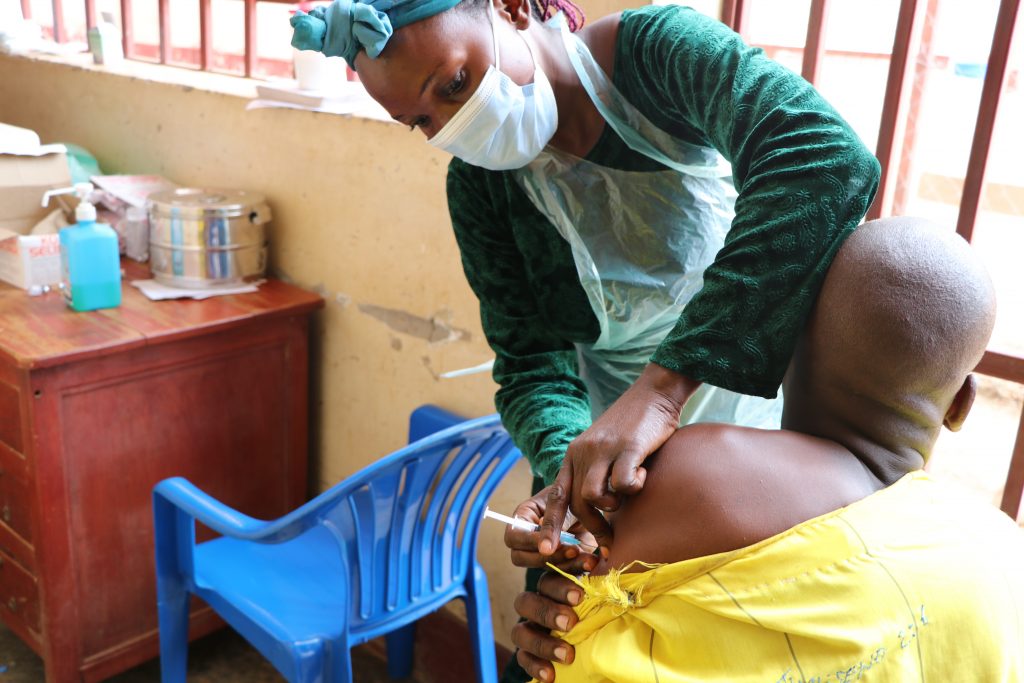A total of 11,137 prisoners, 633 prison staff and 442 of their family members have been vaccinated against COVID-19 as the United Nations Office on Drugs and Crime (UNODC) supports an ongoing vaccination drive by Uganda Prisons Service (UPS).
Twenty-nine prisons in three regions – Kampala Extra, Southern (Masaka) and Southwestern (Mbarara) – benefitted from the vaccination push held from 16 May to 6 June 2022.
UNODC’s logistical support to the Uganda Prisons Service was made possible through the generous financial support of the Government of Norway to the Multi-Partner Trust Fund of the UN Emergency Appeal for COVID-19 Response and its Impacts in Uganda and the Bureau of International Narcotics and Law Enforcement Affairs (INL) of the US Department of State.
The prison environment is highly conducive for the transmission of COVID-19 due to overcrowding and poor ventilation.
UNODC has been encouraged by the Government of Uganda’s proactive response to COVID-19 in prisons and their consideration of the UN Standard Minimum Rules for the Treatment of Prisoners.

“The provision of health care for prisoners is a State responsibility whereby prisoners should enjoy the same standards of health care that are available in the community and should have access to necessary health-care services free of charge, without discrimination on the grounds of their legal status,” the UNODC Head of Office in Uganda, Ms. Sharon Lesa Nyambe, explained.
“The inclusion of the prison community in the Ministry of Health’s vaccination roll-out in since March 2021 cooperation with the Uganda Prisons Services is commendable, especially given the challenges associated with mounting an effective vaccination campaign in prisons,” Ms. Nyambe said.
The prison population in Uganda changes constantly, with the admission of new prisoners and discharge of others.
Consequently, during the vaccination exercise there was a good representation of prisoners who had never been vaccinated, some who were receiving their second dose and a cohort who received their booster dose.
Speaking at the close of the exercise, the Uganda Prisons Service (UPS) Assistant Commissioner of Health, Dr. James Kisambu, said the COVID-19 vaccination rate at national level stands at 40 per cent, according to the Ministry of Health, while just 30 per cent of new prisoners were fully vaccinated.
“Vaccination in prisons means safety for both the prisoners and Uganda at large because prisoners come from and return to the community,” Dr. Kisambu said while expressing his appreciation of the timely intervention from UNODC.
To get the voluntary buy-in of prisoners, staff and family members at each facility, the medical teams – comprising specialised staff from Prison Headquarters in Kampala and at regional level – briefed the prisoners on the importance of COVID-19 vaccines, types of vaccines available and how to manage side-effects should they occur.
“We express our sincere gratitude to UNODC for the support rendered to the Uganda Prisons Service in the vaccination exercise carried out in three high-volume regions of Kampala, southern and southwestern,” Dr. Kisambu said.
UNODC’s earlier support to the COVID-19 response in Uganda’s prisons:
- Following the outbreak of COVID-19 in 2020, UNODC handed over to the Uganda Prisons Service: 40 high-dependence hospital beds with mattresses, 80 bedsheets, 80 blankets, 3,000 mattresses and 3,000 blankets to equip five newly established COVID-19 treatment centres in prisons.
- To support the High Dependency Unit (HDU) at the Prisons Staff Treatment Centre at Luzira, UNODC provided medical equipment that consisted of; six Hospital Oxygen Airflow Splitters, 180 xygen non-rebreathe patient masks and 12 hospital oxygen regulators as well as 400 coveralls, 478 face shields and 12 oxygen cylinders.
- Sixteen (5,000 litre) water tanks, 150 cartons of soap, and 3,000 posters with guidelines on prevention, treatment and care for persons with COVID-19 were distributed to prisons. Sports items, such as footballs, volleyballs and assorted board games, were procured to enhance prisoner’s recreation.
- To support efforts towards prisons decongestion during the lockdown, seven video conferencing systems were procured to facilitate virtual court hearings in the prisons of Gulu, Arua, Mbale, Jinja and Mbarara districts. UNODC provided fuel to support the transfer of released prisoners and facilitated their reintegration into the community. To enhance communication with the outside world, 32 handheld phones were procured for the 16 isolation facilities to allow prisoners communicate with their families and legal counsels during the lock down period.





















